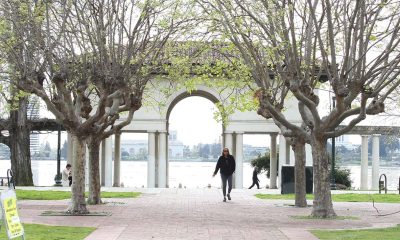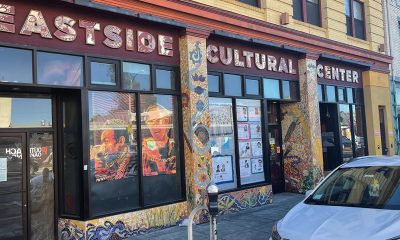Highlights
A Voice for Victims: Cal NAACP Is Helping to Clear Criminal Records for Free
The NAACP expungement program was implemented to reconcile the crippling impact of mass incarceration on the Black community in California. The program which started in September 2019 has helped thousands of formerly incarcerated people get their records clean. Program coordinators work with local governments to waive fees for the expungement process.

Bo Tefu | Impact Alameda
It costs thousands of dollars in California to clear a criminal record of a felony or misdemeanor, but now people can get their record expunged for free with the help of the California State Conference of the National Association for the Advancement of Colored People (NAACP).
The NAACP’s expungement workshops aim to help Black people remove nonviolent charges, “which have affected their ability to obtain employment,” said Rick Callender, president of the NAACP California-Hawaii State Conference.
“Our expungement program is the best kind of advocacy program that we can put out into the community. We know that African Americans and other people of color are charged the most and end up serving the most time,” said Callender.
The criminal justice system has disproportionately affected Black people in the United States as a result of the War on Drugs, a federal government-led effort that claimed to end the trade and distribution of drugs in the 1970s. However, the national campaign created a vicious cycle of mass incarceration in Black communities that affected generations of Americans, particularly low-income families.
The NAACP says the majority of participants taking advantage of the expungement program were convicted on “wobbler charges –indictments determined by a prosecutor’s recommendation for whether an individual should face felony or misdemeanor penalties based on their criminal history.
“These wobbler charges and the criminal justice system have impeded upon African Americans and their ability to get jobs and housing,” said Callender.
“It’s important for the organization to facilitate this program in order to tackle institutional racism in the criminal justice system,” he said.
“These kinds of programs even the playing field for African Americans,” he said.
The NAACP expungement program was implemented to reconcile the crippling impact of mass incarceration on the Black community in California. The program which started in September 2019 has helped thousands of formerly incarcerated people get their records clean. Program coordinators work with local governments to waive fees for the expungement process.
Clearing of criminal records can take anywhere from 30 days to six months depending on the number of charges that need to be removed. The NAACP California State Conference partnered with seven local counties including Alameda County and the Clean Slate Program to start the expungement process at zero cost for people enrolled in the program.
“If you’ve received a misdemeanor, felony, or some kind of wobbler charge, it keeps you from being able to be able to move forward,” said Callender.
“This is truly the great equalizer of advocacy for economic justice,” he said.
Program coordinators in the NAACP work with public defenders and attorneys to host monthly workshops for low-income people who were convicted of a misdemeanor or felony for nonviolent crimes. According to the organization’s leaders, criminal lawyers can charge up to $5,000 for legal fees in addition to the cost of processing the paperwork.
According to the NAACP California State Conference 2020 resolutions, law enforcement convicts Black people based on ‘wobbler charges’ for nonviolent crimes.
“A person who has been arrested and was not convicted now has the burden to petition the court for the expungement. Cost associate to remove the arrest record and expunge it is expensive and excessive for people of color,” the resolution states.
The expungement program coordinators follow up with attendees to track the legal progress of their cases. The law experts working with the organizations evaluate each case and work with each attendee on an individual basis.
“People are just so grateful to get answers in real-time, not waiting on a call center line pressing one or two and hoping that you can get someone,” said Betty Williams the executive director of the NAACP California State Conference.
During one of the workshop sessions, “a young lady cried, thanked us, and gave us praises for the program. Almost all of us started crying, she was sharing how she’s been trying to get this done for the last six years and had no idea that the NAACP was doing something like this,” said Williams.
“We’re giving a voice to those individuals that have been so easily victimized by the criminal justice system,” she said.
Social justice advocates at the NAACP emphasized that Black and Brown people need more initiatives that help heal the harm inflicted by the War on Drugs in their respective communities.
“We have the population that was affected most with the war on drugs,” said Williams.
“Now we have the opportunity to help those individuals clean up their backgrounds and go look for a job without fear,” she said.
The NAACP California State Conference is committed to expanding the expungement program through outreach in its 56 branches across the state. Leaders from other NAACP branches have expressed interest in modeling similar programs to help Black and Brown communities in their respective states.
Education
Dismantling Pipelines to Prison: Fresh Lifelines for Youth (FLY) Reimagines Opportunity for Young People
“Some of the greatest success stories we’ve had is with youth who have been resistant to the process and wanting support,” said Trevor Arceneaux, Associate Director of FLY’s Alameda County operations. “FLY does a really great job at building authentic and trusting relationships with youth. Seeing the change and the walls being torn down and they’re able to engage with us in a different way and let us into their lives where we can understand and learn their needs. Then, we’re able to tap into their genius and get them to operate in the community with a different way.”

Edward Henderson | Impact Alameda
The ACLU defines the school to prison pipeline as a “national trend wherein children are funneled out of public schools and into the juvenile and criminal justice systems.”
Many of the children that fall into this pipeline have learning disabilities, are victims of neglect, abuse, and would benefit from additional services.
However, too many of them have also been subjected to systematic zero-tolerance policies that criminalize minor infractions and serve as catapults, feeding more children into the pipeline to prison.
Fresh Lifelines for Youth (FLY), is an Oakland-based organization dedicated to dismantling the school to prison pipeline by equipping youth with knowledge of the law and empowering youth with a community of supporters that amplify their voices.
FLY’s mission is poetic in the sense that the voices of youth who fell victim to the prison pipeline served as the foundation for the organization’s creation.
Back in 1995, Christa Gannon, FLY’s founder and Stanford University Law School graduate, would often converse with teens facing significant prison time about services that could steer other children away from incarceration.
In many of their responses, the children mentioned education of the law — to know the consequences of poor choices – as well as having role models and opportunities to be of service to their communities. Those ideas are the pillars that FLY was built on.
“Education is power,” said Trevor Arceneaux, Associate Director of FLY’s Alameda County operations. “There are a lot of opportunities to practice that power. It helps to develop a young person’s critical consciousness of the world and how they see it. A lot of times our young people are actively in this pipeline, and they can name it and see it. We can give them options on how to solve these real-world issues.”
In 2000, FLY transitioned to a non-profit, building on the concepts of law education and empowerment. Today, FLY is now one of the Bay Area’s most respected agencies working with youth who are currently or formerly involved in the juvenile justice system.
With 70 staff and more than 200 volunteers, FLY serves more than 2,000 youth throughout the Bay Area each year, ranging from ages 11 to 24.
“Some of the greatest success stories we’ve had is with youth who have been resistant to the process and wanting support,” said Arceneaux. “FLY does a really great job at building authentic and trusting relationships with youth. Seeing the change and the walls being torn down and they’re able to engage with us in a different way and let us into their lives where we can understand and learn their needs. Then, we’re able to tap into their genius and get them to operate in the community with a different way.”
These authentic connections are fostered in the many programs FLY offers to equip youth with the knowledge and confidence they need to navigate life and avoid pitfalls.
In Alameda County FLY offers 4 core programs that provide pivotal services and education.
The Court Appointed Friend and Advocate (CAFA) Mentor Program pairs youth with mentors to meet weekly and support them in developing new behaviors, ambitions and attitudes. Each mentor/mentee pairing has a FLY case manager for support who also attends monthly group activities organized by FLY. All mentors are also granted legal standing to act as advocates for their mentees in the courtroom and at schools.
The FLY Law Program is an interactive 8-to-12-week course covering topics such as police encounters, accomplice liability, three strikes, theft, vandalism, drugs, gangs, and police arrests. The curriculum also touches on critical life skills like anger management, problem solving, conflict resolution, and resisting negative peer pressure. Mid-way through the semester, youth take a field trip to a local university law school where they tour the campus and act out a mock trial in the moot courtroom.
The Leadership Training Program helps youth build the skills and attitudes they need to live a crime-free, self-sufficient life. The program traditionally kicks off with a three-day wilderness retreat that enables youth to break away from negative influences and stresses and begin bonding with FLY staff and peers, developing trust and teamwork skills. (Because of the pandemic, virtual or socially distanced activities have replaced the retreats.) Following the retreat, youth meet monthly to support each other in group settings and to design projects in which they advocate for positive change and give back to their communities. Each young person receives intensive coaching from a FLY case manager to identify and address their greatest barriers.
The STAY FLY Program is a reentry program that develops social emotional learning skills and knowledge of the law in youth ages 18-25. A three-tier system is implemented to support youth as they transition back into the community. Law-related education, pro-social events and civic engagement activities, along with case management and coaching are offered to participants.
“Youth really love being around FLY staff,” said Arceneaux. “That’s more important to me than anything. They are going to remember the connections they have. When I see youth cracking jokes or hitting up staff to tell them about an accomplishment, that lets me know we’re doing what we’re supposed to be doing. We’re really pushing youth to use their voice. In the next three to five years, you’re going to hear about former or current FLY youth advocating or pushing for systematic change. Tapping into their sense of agency and impacting the entire world.”
Business
Is an Employer or Landlord Using Your Felony Conviction Against You? Here’s What You Can Do
The California Department of Fair Employment and Housing (DFEH) is also encouraging the public to report housing ads that use discriminatory language to exclude certain racial groups, immigrants, people with felonies, and applicants with Section 8 or U.S. Department of Housing and Urban Development (HUD) vouchers; etc.

Edward Henderson | Impact Alameda
The California state government has been reminding businesses and landlords across the state that it is illegal to discriminate against job and rental applicants because they have committed felonies or misdemeanors in the past.
The California Department of Fair Employment and Housing (DFEH) is also encouraging the public to report housing ads that use discriminatory language to exclude certain racial groups, immigrants, people with felonies, and applicants with Section 8 or U.S. Department of Housing and Urban Development (HUD) vouchers; etc.
“The California Department of Fair Employment and Housing announced a new effort to identify and correct violations of the Fair Chance Act, a pioneering state law that seeks to reduce barriers to employment for individuals with criminal histories,” a DFEH statement read.
The Fair Chance act, which took effect on January 1, 2018, was written to increase access to employment and housing for Californians with criminal histories — a way to reduce recidivism, among other goals. Employers with five or more employees are prohibited from asking a job candidate about conviction history during the hiring process or when advertising a vacancy.
Since the law passed, the state has sent more than 500 notices to businesses informing them that they have violated protections put in place to protect people seeking work.
The DFEH says it is implementing new technologies to conduct mass searches of online job applications that include unlawful statements. For example, some businesses explicitly state in hiring advertisements that they would not consider applicants with criminal records.
“Using technology to proactively find violations of the state’s anti-discrimination laws is a powerful strategy for our department to protect Californians’ civil rights,” said DFEH Director Kevin Kish. “DFEH is committed to preventing employment discrimination through innovative enforcement actions and by providing clear guidance to employers.”
DFEH released a toolkit to aid employers in adhering to the Fair Chance Act guidelines. The toolkit includes sample forms and guides employers can use to follow required procedures; a suggested statement that employers can add to job advertisements and applications to let applicants know that they will consider individuals with criminal histories; answers to frequently asked questions (FAQs) about the Fair Chance Act and an informational video that explains the Fair Chance Act.
In addition, DFEH plans to release an interactive training and an online app this year.
Before authorities lifted the statewide COVID-19 public health restrictions, DFEH also warned businesses against masking discrimination with COVID safety precautions.
“As Californians navigate the COVID-19 pandemic, the Department of Fair Employment and Housing has provided guidance to protect civil rights and mitigate risk of COVID-19 transmission in employment, housing, healthcare, and, in our guidance released today, businesses open to the public,” said Kish. “We can and must uphold civil rights while simultaneously disrupting the spread of COVID-19.”
DFEH encourages individuals to report job and housing advertisements violating the Fair Chance Act or other instances of discrimination.
Visit the DFEH website to file complaints. (https://ccrs.dfeh.ca.gov/s/login/)
California
COVID Recovery in Alameda County: Our Church Is Offering Free Tests
Variants still pose a threat. And case numbers are still on a gradual decline here in California and around the country. Therefore, we can’t throw all caution to the wind when it comes to keeping our loved ones safe and healthy. The death rate resulting from COVID-19 is still higher for Black Californians than the statewide average, according to numbers from the California Department of Public Health.
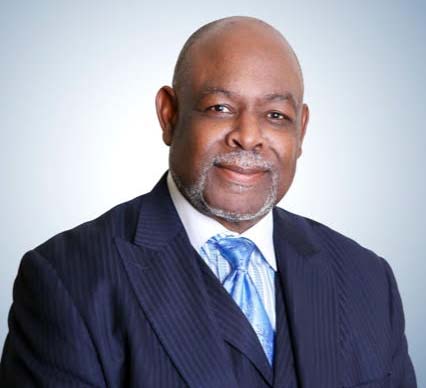
Rev. Gerald L. Agee | Impact Alameda
States and cities have lifted mask mandates and other COVID-related restrictions. But even as we readjust to life as it was before the pandemic, we know that COVID is not fully gone for good.
Variants still pose a threat. And case numbers are still on a gradual decline here in California and around the country. Therefore, we can’t throw all caution to the wind when it comes to keeping our loved ones safe and healthy. The death rate resulting from COVID-19 is still higher for Black Californians than the statewide average, according to numbers from the California Department of Public Health.
At the height of the coronavirus crisis, Black pastors across California recognized the urgency of the COVID-19 threat. As we move from pandemic to endemic, we still do.
We continue to accept the responsibility of this fight, and we understand as faith leaders in our communities that we must combine faith with action. Prayers for healing and health must be backed up by a plan for protection and prevention that keep our communities safe and the virus at bay.
That is why dozens of faith leaders across our state have worked together to keep the doors of our churches open for convenient COVID-19 testing. Some sites offer vaccinations. This effort to keep our congregations and our neighborhoods safe has been made possible with the support of our testing partner Color and the California Department of Public Health.
The pastors in our network, their congregations, staff, and volunteers at our churches and in our community have done an excellent job. Their effort has contributed in no small way to the high COVID-19 vaccination rate and low positivity rate we now have in California. We are truly proud and grateful.
As we walk into this new phase of our COVID-19 response, we must prioritize safety, especially for those among us who are aging or otherwise fragile.
As our slogan tells us, “Don’t guess, get the test” before fully chucking your mask, or going back to work or traveling to see loved ones.
Look up one of our centers in your community to get vaccinated and tested. It is the surest way that we can stem the spread of this virus.
We must decide to renew our hope and lead with faith even stronger than we have been doing. With that resolve, committing ourselves to keeping each other and our communities safe will be easy.
Remember, we can end this endemic once and for all — together.
About the Author
The Rev. Gerald L. Agee is the founder and pastor of Christian Friendship Church in Oakland and the statewide manager for the Black church testing program.
-
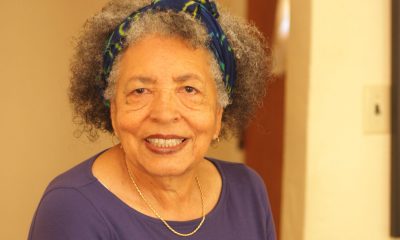
 Business2 years ago
Business2 years agoVolunteer to V.P.: Margot Dashiell Fights for Families Dealing With Mental Illness, Trauma
-
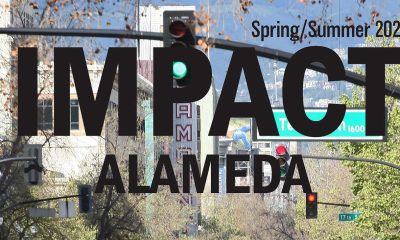
 Resource Guide2 years ago
Resource Guide2 years agoIMPACT MEDIA | SPRING / SUMMER 2022
-

 Highlights2 years ago
Highlights2 years agoJustice = Jobs: YEP, an Oakland Org, Prepares Youth for Careers, Education Access
-

 Business2 years ago
Business2 years agoWalking by Faith, Leading with Love: Rev. Ken Chambers Invests in Alameda County
-

 Business2 years ago
Business2 years agoA Voice for Victims: Cal NAACP Is Clearing Criminal Records for Free
-
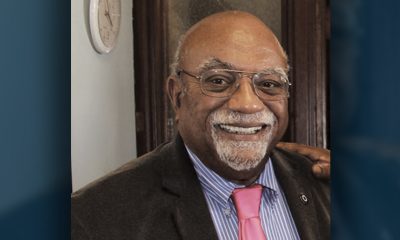
 Highlights2 years ago
Highlights2 years agoJuvenile Justice in Alameda County: We’re on Our Way but More Needs to Be Done for Our Children
-

 Business3 years ago
Business3 years agoMichala Toscas: Oakland Cannabis Kitchen
-

 Business2 years ago
Business2 years agoProtect Your Mental Health: Four Things You Can Do in Your Own Space (at Your Own Pace)

